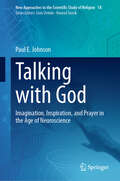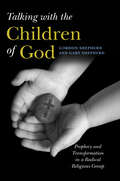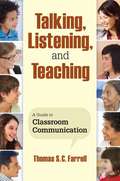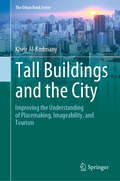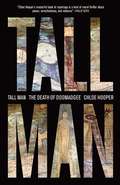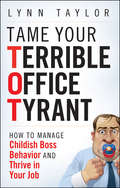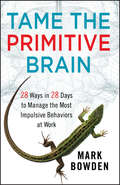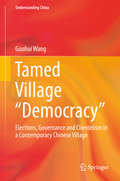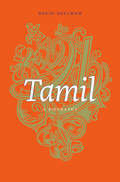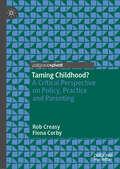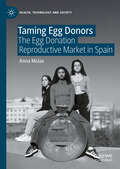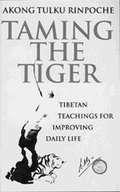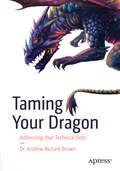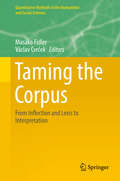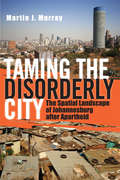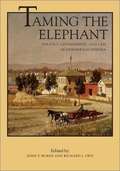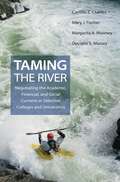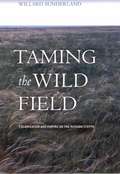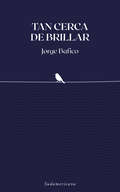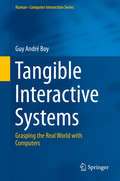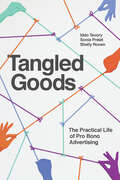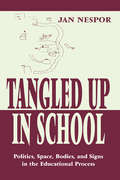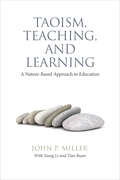- Table View
- List View
Talking with God: Imagination, Inspiration, and Prayer in the Age of Neuroscience (New Approaches to the Scientific Study of Religion #18)
by Paul E. JohnsonTalking with God examines the neuroscience of belief and belief change related to prayer. It puts forward a model based on neuroscience and theology to understand how God speaks to us individually and inspires us through the human capacities for language and imagination. Offering a fresh, integrated perspective for those who struggle with the dissonance between their experience in the physical world and a healing spiritual life, this work navigates a path to reconcile religious spirituality with science. It also sheds light on an integrated view of science and religious belief, accepting the physicality of consciousness while allowing for spirituality in the form of divine inspiration. Talking with God is an original academic contribution to the field of science and religion and an indispensable read for researchers and readers interested in the concept of belief and belief change from a neuroscientific perspective.
Talking with the Children of God: Prophecy and Transformation in a Radical Religious Group
by Gary Shepherd Gordon ShepherdGrounded in direct, systematic observation by neutral observers, Talking with the Children of God is a unique study of the radical religious movement now known as The Family International. The book draws on extraordinarily candid interviews with the group's leaders and administrative staff. In revealing new information about the organization's history, beliefs, and use of prophecy, Gordon Shepherd and Gary Shepherd offer a highly detailed case study that is both an antidote to sensationalized coverage of the group and a means for understanding the transformational practices of new religious movements in general. One of the most controversial groups emerging from the Jesus People movement of the 1960s, the Family originally was known as The Children of God. Under leader David Berg, members proclaimed an apocalyptic "Endtime," shunned secular occupations, lived communally, and adopted unusual sexual practices that led to abuse scandals in the 1970s and 1980s. Following Berg's death in 1994, the organization began to dramatically alter its evangelization efforts and decision-making processes. Talking with the Children of God builds a picture of a complex organization with ten thousand core members worldwide, including details on the lives, careers, and responsibilities of the second generation and their efforts to defend their faith. The authors summarize the Family's history and beliefs as well as its controversial past. In particular, they analyze the organization's use of prophecy--or channeled revelations from Jesus and other spiritual beings--for making decisions and setting policy, revealing how this essentially democratic process works and how it shapes Family life and culture. These remarkable insights are the result of sixteen years of surveys and field observations conducted in Family member homes in sixteen countries, plus four days of face-to-face interviews with Family leaders and organizational staff. The volume also includes condensed transcripts of the interviews with analysis by Shepherd and Shepherd.
Talking, Listening, and Teaching: A Guide to Classroom Communication
by Thomas S. FarrellTalking, Listening, and Teaching demonstrates how important it is for teachers to understand and monitor classroom communication patterns and resolve problems that may hamper students' learning. Using examples from real classrooms, the author explainsHow classroom talk is different from communication outside the classroomHow to gather and analyze data about classroom talkWhat type of questioning generates good discussionsWhy and how to give feedback to studentsHow nonverbal communication impacts the classroomThis insightful guide to classroom communication, featuring provocative "Thinking About Your Own Classroom" questions, is ideal for teacher study groups and benefits educators who wish to effectively manage this important aspect of teaching and learning.
Tall Buildings and the City: Improving the Understanding of Placemaking, Imageability, and Tourism (The Urban Book Series)
by Kheir Al-KodmanyThe chaotic proliferation of skyscrapers in many cities around the world is contributing to a decline in placemaking. This book examines the role of skyscrapers and open spaces in promoting placemaking in the city of Chicago. Chicago’s skyscrapers tell an epic story of transformative architectural design, innovative engineering solutions, and bold entrepreneurial spirit. The city’s public plazas and open spaces attract visitors, breathe life, and bring balance into the cityscape. Using locational data from social media platforms, including Twitter, Facebook, and Instagram, along with imagery from Google Earth, fieldwork, direct observations, in-depth surveys, and the combined insights from architectural and urban design literature, this study reveals the roles that socio-spatial clusters of skyscrapers, public spaces, architecture, and artwork play to enhance placemaking in Chicago. The study illustrates how Chicago, as the birthplace of skyscrapers, remains a leading city in tall building integration and innovation. Focusing on some of the finest urban places in America, including the Chicago River, the Magnificent Mile, and the Chicago Loop, the book offers meaningful architectural and urban design lessons that are transferable to emerging skyscraper cities around the globe.
Tall Man
by Chloe HooperEarly in 2005 Chloe Hooper was drawn into the bewildering and tragic case of Cameron Doomagee, an Aboriginal man on Australia's Palm Island, who died in police custody within one hour of his arrest. Like Joan Didion and Norman Mailer, Hooper brings a novelist's eye for detail and an acute understanding of character to this story. She explores the daily lives of these people, the role of the mythology and superstition, the impact of landscape, and the history of devastating repression, addiction and violence among the Aboriginal people. Hooper is brought to Palm Island by the lawyer representing Doomagee. She spends months garnering the trust of all involved. She recreates both the dramatic events of one morning and all the forces, "individual and historic" that led up to it. And then she chronicles the trial of the charismatic police Sergeant charged with manslaughter, "the first police office in Australia ever to be charged over a death in custody. This is an outstanding account of a landmark episode in Australian history, a searing story of racial conflict that will resonate with American readers.
Tame Your Terrible Office Tyrant
by Lynn TaylorAn indispensable guide to dealing with challenging, childish boss behavior and building a great career, with laugh- out-loud humor built in. Based on extensive interviews among workers, managers and psychologists, Tame Your Terrible Office Tyrant™ draws hilarious but true parallels between toddlers and managers. When under stress, both often have trouble moderating their power, or lose the ability to think rationally. Traits in common include tantrum-throwing, demanding, stubborn, moody, fickle, self-centered, needy and whiny behavior. BADD (Boss Attention Deficit Disorder) is discussed as part of "Short Attention Spans. " There are 20 chapter traits in all, divided into "Bratty" and "Little Lost Lamb" categories, for easy reference, including real anecdotes and many useful tips. When bad bosses run amok in companies, nobody wins. This book shows readers how to build positive relationships with even the most out-of-control boss, and still thrive in your job. The key to success lies in dealing with a Terrible Office Tyrant (or TOT™) much like a parent deals with a troublesome toddler. With true stories and time-tested solutions, this is the perfect guide managing a boss stuck in his Terrible Twos. Taylor takes you behind all the bossy blustering, so that you can focus on getting ahead - and achieve career excellence. Savvy top management will also gain insight on what not to do with their team. They know that Terrible Office Tyrant (TOT) managers may not be in plain sight (they don't leave juice stains on the hallway carpet!) But they do wreak havoc on the bottom line. A special section helps senior management and Human Resource departments mitigate TOT behavior for a more productive workplace.
Tame the Primitive Brain
by Mark BowdenA new and simple system to understanding and controlling the behavior of othersNoted body language, behavior and communication expert Mark Bowden offers a totally practical, easy-to-read guide to understanding the impulsive actions of others, along with the best tools to manage them. A number one anxiety in business is dealing with problem people. In Tame the Primitive Brain, Mark Bowden's fresh approach is the fastest and most effective way to understand why someone acts towards you the way they do; why you react to their behavior in the way you do; and most importantly, what exactly to do about it to achieve the right outcomes.Brings new and fresh perspectives to business readers for dealing with tricky behaviorsExplains how to effectively manage those around you at any level in an organization Shares the latest evolutionary behavioral theory, neuroscientific evidence, and the tried and tested tools and tricks based on these premisesThis simple model of how we humans can and do relate to each other brings increased depth of understanding and expands your toolset to better manage yourself and others to achieve anything.
Tamed Village "Democracy"
by Guohui WangWang's book offers an empirically rich and conceptually nuanced analysis of how local state agents maintain control over village self-governance in China. His careful analysis of primary documents enables him to explicate the formal mechanisms used by members of the local state to influence village affairs. Meanwhile, his rigorous and fascinating ethnographic data enable him to elucidate the manifold ways in which informal clientelist ties between local state officials and village elites permit the former to exert control. Overall, this excellent book powerfully demonstrates the need for scholars to go beyond attention to election processes when evaluating what village democracy means in a Chinese context. It is a must-read for all serious scholars of Chinese politics and society. --Rachel Murphy, University of Oxford Guohui Wang's highly original, in-depth case research vividly reveals the dynamics of contemporary Chinese village politics. By combining abundant empirical data with close observation as an "insider," his book illustrates the processes and consequences of transplanting 'democracy' into rural Chinese society. Particularly for those in the West who are keen on understanding the ongoing transformation of rural China, this book is a rich and revealing source. --Shukai Zhao, Development Research Center of the State Council, P. R. China
Tamil: A Biography (Princeton Legacy Library #597)
by David ShulmanSpoken by eighty million people, Tamil is one of the great world languages, and one of the few ancient languages that survives as a mother tongue. David Shulman presents a comprehensive cultural history of Tamil, emphasizing how its speakers and poets have understood the unique features of their language over its long history.
Taming Childhood?: A Critical Perspective on Policy, Practice and Parenting
by Rob Creasy Fiona CorbyThis book explores the links between recent reports of increasing levels of unhappiness and mental health problems amongst children and young people, and changes within childhood which restrict and reduce opportunities for children to develop and maintain resilience. Although in academic terms children may be viewed as beings, Creasy and Corby posit that there is much to suggest that for parents, practitioners and policy-makers, children are primarily seen as becomings. The book argues that viewing children as becomings, together with the idea that childhood is fraught with danger, contributes to practices and policies which can be seen as making childhood tame. This taming of childhood leads to an impoverished childhood that does not provide the space that children need to grow and develop. Furthermore, Taming Childhood? challenges the idea that young adults are 'snowflakes', unable to cope with everyday pressures. Students and scholars across a range of social science disciplines will find this book of interest.
Taming Egg Donors: The Egg Donation Reproductive Market in Spain (Health, Technology and Society)
by Anna MolasSpain has become one of the most prominent fertility markets in the world, largely fuelled by the availability of human eggs. Behind the promise of cutting-edge technology and parenthood lies a carefully tailored system to recruit, manage, and discipline egg donors. In this book, Anna Molas explores how young women are incorporated as egg donors into the global reproductive industry. Through in-depth ethnographic fieldwork with both donors and clinicians, the book reveals the fragile processes of selection, monitoring, and control that ensure the supply of human eggs. Introducing the concept of taming, Molas illuminates the gendered, racialized, and classed dimensions of reproductive labor. Engaging with the political economy of reproduction and the future of reproductive medicine, this book is an essential resource for scholars in medical anthropology, Science and Technology Studies, and feminist studies.
Taming The Tiger: Tibetan Teachings For Improving Daily Life
by Akong Tulku RinpocheTAMING THE TIGER offers a simple approach to finding happiness for oneself that also brings happiness to others. Based on twenty years of Buddhist teaching in the West, Taming the Tiger aims to help anyone seeking the truth about suffering and happiness. The first part of the book deals with topics such as Impermanence, The Right Motivation, Facing the Situation, Body, Speech and Mind, Compassion, and Mindfulness. The second part is devoted to exercises, meditations and relaxation techniques for body and mind, including Feeling, Openness, Taking Suffering, Bringing the Buddha to Life and Universal Compassion. The exercises, designed to provide a base of self-knowledge, mind-therapy and self-healing have also been found beneficial in therapy workshops and in the treatment of psychological problems.This practical programme has been tested and refined first at therapy workshops of Samye Ling in Scotland - the oldest Tibetan Buddhist centre in the West - and has since confirmed its success in cities throughout Europe, North America and Africa, bringing definitive solutions to long-term problems weighing heavily on the mind.
Taming Your Dragon: Addressing Your Technical Debt
by Dr. Andrew BrownTechnical debt is an often-overlooked problem that the software industry needs to take more seriously. All organizations are impacted by it, most wish that they had less of it, but need help in understanding the nature of the beast. This book aims to clear up any misconceptions and show you how to implement a sound technical debt management program to suit your company’s needs. You’ll learn the greatest challenge in solving the technical debt dilemma is not to find solutions to it, but rather to find solutions to the human and organizational issues that lead to that debt. For example, convincing senior stakeholders of the importance of addressing technical debt, getting stakeholders to acknowledge how their actions lead to unintentional debt, and enabling teams to prioritize technical debt over short-term goals. Therefore, this book is divided into three parts: defining technical debt, understanding technical debt, and tackling technical debt. It begins by explaining why technical debt should not be considered a technical problem, but rather a problem of how trade-off decisions are made. You’ll then examine how making decisions using the affect heuristic, more commonly known as a “gut feeling,” can lead to unnecessary technical debt, followed by some techniques for combating your vulnerability to this trap. Reducing your organization’s level of technical debt is not easy. Taming Your Dragon will show you how to implement a technical debt management program. What You Will Learn Review a new paradigm based on technical debt being a combination of trade-off problems and system problems Understand the many ways that technical debt adversely affects an organization’s ability to deliver IT change Create an effective process for addressing technical debt See why analogies are important Who This Book Is For Software teams supporting DevOps, managers, and other business stakeholders looking to implement a technical debt management program.
Taming the Corpus: From Inflection and Lexis to Interpretation (Quantitative Methods in the Humanities and Social Sciences)
by Masako Fidler Václav CvrčekThis book bridges the current quantitative and qualitative text analyses, using grammar as a crucial source of investigation. Taking data from Czech, an inflected language, in which the most optimal conditions to respond to this research question are met, the book expands the understanding of language and text in ways that have not been executed before. For predominantly English-based quantitative research, this volume fills a crucial gap by examining the relationship between inflection and other phenomena (including discourse, translation and literature). For the current qualitative research, the volume provides large empirical data to confirm some of its claims, but more importantly, it demonstrates the important role of detailed grammatical concepts that have not been considered before. Besides addressing fundamental questions about text analysis methods, the volume presents a diverse array of Czech data that are unique in their own right and worthy of dissemination to the general audience. Taming the Corpus: From Inflection and Lexis to Interpretation is divided into three sections. Section 1 deals with phonotactics, poetic structure, morphological complexity used to differentiate literary style, and native speakers’ sense of grammaticality – issues pertinent to linguistic typology, cognition and language, and literary studies. Section 2 focuses on inter-language relations, especially the theory of translation. Section 3 demonstrates how quantitative analysis of texts can contribute to our understanding of society and connects the volume to legal language, construction of gender and discourse position and implicit ideology.
Taming the Disorderly City: The Spatial Landscape of Johannesburg after Apartheid
by Martin J. MurrayIn postapartheid Johannesburg, tensions of race and class manifest themselves starkly in struggles over "rights to the city." Real-estate developers and the very poor fight for control of space as the municipal administration steps aside, almost powerless to shape the direction of change. Having ceded control of development to the private sector, the Johannesburg city government has all but abandoned residential planning to the unpredictability of market forces. This failure to plan for the civic good—and the resulting confusion—is a perfect example of the entrepreneurial approaches to urban governance that are sweeping much of the Global South as well as the cities of the North.Martin J. Murray brings together a wide range of urban theory and local knowledge to draw a nuanced portrait of contemporary Johannesburg. In Taming the Disorderly City, he provides a focused intellectual and political critique of the often-ambivalent urban dynamics that have emerged after the end of apartheid. Exploring the behaviors of the rich and poor, each empowered in their own way, as they rebuild a new Johannesburg, we see the entrepreneurial city: high-rises, shopping districts, and gated communities surrounded by and intermingled with poverty. In graceful prose, Murray offers a compelling portrait of the everyday lives of the urban poor as seen through the lens of real-estate capitalism and revitalization efforts.
Taming the Elephant: Politics, Government, and Law in Pioneer California
by John F. Burns Richard J. OrsiLively, authoritative essays on the political history of California from the Gold Rush and the achievement of statehood through the end of the 19th century. The fourth and final volume in a series of essays on California history, co-published with the California State Historical Society.
Taming the River: Negotiating the Academic, Financial, and Social Currents in Selective Colleges and Universities (The William G. Bowen Series #51)
by Douglas S. Massey Mary J. Fischer Camille Z. Charles Margarita A. MooneyBuilding on their important findings in The Source of the River, the authors now probe even more deeply into minority underachievement at the college level. Taming the River examines the academic and social dynamics of different ethnic groups during the first two years of college. Focusing on racial differences in academic performance, the book identifies the causes of students' divergent grades and levels of personal satisfaction with their institutions. Using survey data collected from twenty-eight selective colleges and universities, Taming the River considers all facets of student life, including who students date, what fields they major in, which sports they play, and how they perceive their own social and economic backgrounds. The book explores how black and Latino students experience pressures stemming from campus racial climate and "stereotype threat"--when students underperform because of anxieties tied to existing negative stereotypes. Describing the relationship between grade performance and stereotype threat, the book shows how this link is reinforced by institutional practices of affirmative action. The authors also indicate that when certain variables are controlled, minority students earn the same grades, express the same college satisfaction, and remain in school at the same rates as white students. A powerful look at how educational policies unfold in America's universities, Taming the River sheds light on the social and racial factors influencing student success.
Taming the Wild Field: Colonization and Empire on the Russian Steppe
by Willard SunderlandWillard Sunderland chronicles the colonization of the Russian steppes & discusses how the steppe lands have changed in the Russian imagination over time, from the 'wild field' of the middle ages, to the iconic status of the 19th century, when the vast grasslands had become a symbol of Russian nationhood.
Tan cerca de brillar
by Jorge BaficoUn libro intenso y personal. La crónica de la pérdida de un hijo como motivo literario, que habilita y proyecta un recorrido emotivo y sanador a través de los vínculos familiares, la posibilidad de salir del dolor y recuperar la esperanza. Este libro es testigo de una batalla contra el dolor lacerante de una pérdida. Jorge Bafico intenta construir una ficción que se aleje de la angustia vivida, pescando palabras que sirvan para transmutar el sufrimiento y convertirlo en poesía. Estas páginas son parte de un relato dedicado a alguien que no pudo florecer. A través de la mirada compasiva y llena de empatía de su narrador, las personas y las situaciones retratadas iluminan el pasado y el presente, obrando el milagro de convertir el dolor en esperanza.
Tangible Interactive Systems
by Guy André BoyDistinguishingbetween tangible user interfaces (TUI) and tangible interactive systems (TISs),this book takes into account not only the user interfaces but also looks at howinteraction can be enabled by using digital information through the physicalenvironment. TISs go far beyond the concept of tangible user interfaces,addressing large complex systems in the framework of human-centred design andputting the human at the center of the design process from the start. Howcan human-centered designers grasp the real world with computers? This questionis explored by looking at concepts such as innovation, complexity, flexibility,maturity, stability, sustainability and art to see whether we can assess bothphysical and figurative tangibility during the design process before productdelivery. Concepts like creativity, design thinking and team spirit arefundamental to TIS's human-centered design, and are presented together withhuman-systems integration (HSI), agile development and formative evaluations tobuild a greater understanding of this new area of research. TangibleInteractive Systems wouldbe an essential read to designers, academics and other professionals concernedwith product design within HCI, industrial design, virtual engineering andother related areas.
Tangled Goods: The Practical Life of Pro Bono Advertising
by Iddo Tavory Sonia Prelat Shelly RonenA novel investigation of pro bono marketing and the relationship between goods, exploring the complex moral dimensions of philanthropic advertising. The advertising industry may seem like one of the most craven manifestations of capitalism, turning consumption into a virtue. In Tangled Goods, authors Iddo Tavory, Sonia Prelat, and Shelly Ronen consider an important dimension of the advertising industry that appears to depart from the industry’s consumerist foundations: pro bono ad campaigns. Why is an industry known for biting cynicism and cutthroat competition also an industry in which people dedicate time and effort to “doing good”? Interviewing over seventy advertising professionals and managers, the authors trace the complicated meanings of the good in these pro bono projects. Doing something altruistic, they show, often helps employees feel more at ease working for big pharma or corporate banks. Often these projects afford them greater creative leeway than they normally have, as well as the potential for greater recognition. While the authors uncover different motivations behind pro bono work, they are more interested in considering how various notions of the good shift, with different motivations and benefits rising to the surface at different moments. This book sheds new light on how goodness and prestige interact with personal and altruistic motivations to produce value for individuals and institutions and produces a novel theory of the relationship among goods: one of the most fraught questions in sociological theory.
Tangled Goods: The Practical Life of Pro Bono Advertising
by Iddo Tavory Sonia Prelat Shelly RonenA novel investigation of pro bono marketing and the relationship between goods, exploring the complex moral dimensions of philanthropic advertising. The advertising industry may seem like one of the most craven manifestations of capitalism, turning consumption into a virtue. In Tangled Goods, authors Iddo Tavory, Sonia Prelat, and Shelly Ronen consider an important dimension of the advertising industry that appears to depart from the industry’s consumerist foundations: pro bono ad campaigns. Why is an industry known for biting cynicism and cutthroat competition also an industry in which people dedicate time and effort to “doing good”? Interviewing over seventy advertising professionals and managers, the authors trace the complicated meanings of the good in these pro bono projects. Doing something altruistic, they show, often helps employees feel more at ease working for big pharma or corporate banks. Often these projects afford them greater creative leeway than they normally have, as well as the potential for greater recognition. While the authors uncover different motivations behind pro bono work, they are more interested in considering how various notions of the good shift, with different motivations and benefits rising to the surface at different moments. This book sheds new light on how goodness and prestige interact with personal and altruistic motivations to produce value for individuals and institutions and produces a novel theory of the relationship among goods: one of the most fraught questions in sociological theory.
Tangled Goods: The Practical Life of Pro Bono Advertising
by Iddo Tavory Sonia Prelat Shelly RonenA novel investigation of pro bono marketing and the relationship between goods, exploring the complex moral dimensions of philanthropic advertising. The advertising industry may seem like one of the most craven manifestations of capitalism, turning consumption into a virtue. In Tangled Goods, authors Iddo Tavory, Sonia Prelat, and Shelly Ronen consider an important dimension of the advertising industry that appears to depart from the industry’s consumerist foundations: pro bono ad campaigns. Why is an industry known for biting cynicism and cutthroat competition also an industry in which people dedicate time and effort to “doing good”? Interviewing over seventy advertising professionals and managers, the authors trace the complicated meanings of the good in these pro bono projects. Doing something altruistic, they show, often helps employees feel more at ease working for big pharma or corporate banks. Often these projects afford them greater creative leeway than they normally have, as well as the potential for greater recognition. While the authors uncover different motivations behind pro bono work, they are more interested in considering how various notions of the good shift, with different motivations and benefits rising to the surface at different moments. This book sheds new light on how goodness and prestige interact with personal and altruistic motivations to produce value for individuals and institutions and produces a novel theory of the relationship among goods: one of the most fraught questions in sociological theory.
Tangled Up in School: Politics, Space, Bodies, and Signs in the Educational Process (Sociocultural, Political, and Historical Studies in Education)
by Jan NesporBased on two years of ethnographic fieldwork in an urban elementary school, this volume is an examination of how school division politics, regional economic policies, parental concerns, urban development efforts, popular cultures, gender ideologies, racial politics, and university and corporate agendas come together to produce educational effects. Unlike conventional school ethnographies, the focus of this work is less on classrooms than on the webs of social relations that embed schools in neighborhoods, cities, states, and regions. Utilizing a variety of narratives and analytical styles, this volume: * explores how curriculum innovations are simultaneously made possible by and undermined by school district politics, neighborhood histories, and the spatial and temporal organizations of teachers' and parents' lives; * situates the educational discourse of administrators and teachers in the changing economic and political climates of the city; * analyzes the motivations behind an effort by school and business proponents to refashion classrooms within the school into business enterprises, and of children's efforts to make sense of the scheme; * examines the role of the school as a neighborhood institution, situating it at the intersections of city planners' efforts to regulate city space and children's efforts to carve out live spaces through out-of-school routines; * contemplates the meaning of school as a site for bodily experience, and looks at how patterns of space and control in the school shaped children's bodies, and at how they continued to use body-based languages to construct maturity, gender, and race; and * investigates the school as a space for the deployment of symbolic resources where children learned and constructed identities through their engagements with television, comic books, movies, and sports. Tangled Up In School raises questions about how we draw the boundaries of the school, about how schools fit into the lives of children and cities, and about what we mean when we talk about "school."
Taoism, Teaching, and Learning: A Nature-Based Approach to Education
by John P. MillerThe ancient Chinese philosophy of Taoism contains profound wisdom about the cosmos, nature, human life, and education. Taoism seeks to be in harmony with nature, and using it as a guide can help us live in a way that is healing to both ourselves and the planet. Taoism, Teaching, and Learning identifies key aspects of Taoist thought and highlights how these principles can promote a holistic approach to teaching and learning. In particular, this book offers educators guidelines and pedagogical examples for how to instil a perspective of interconnectedness into their classrooms. It sheds light on how philosophical Taoism articulates a vision of the universe and life that mirrors the actual realities of nature. Providing frameworks and methods for teaching and learning based on the interconnectedness of life, Taoism, Teaching, and Learning develops an inspiring vision for education and helps us to see our world in a deeply holistic and meaningful way.
